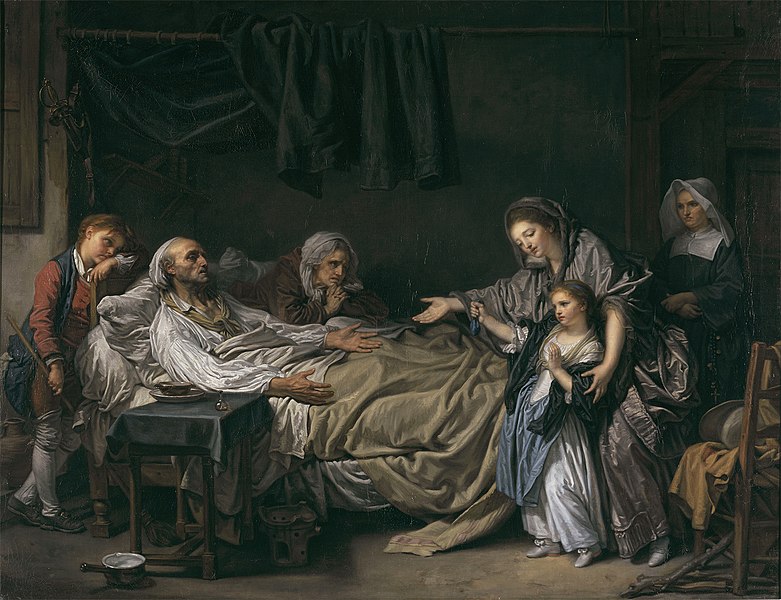One way that churches engage the larger community is to help the poor and marginalized through liberal charity and charitable outreach (think paying for food and services, or organizing a community meal night or food pantry). But this engagement does not necessarily lead to a stronger, more involved church community. Indeed, whether in or beyond the church environment, despite increasing levels of giving and outreach in absolute terms, there has been a steady decrease in numbers of volunteers and numbers of people involved in charitable giving in America.
The University of Maryland’s Do Good Institute reported in 2018 that, despite a record increase in total hours and dollars given, “fewer Americans are engaging in their community by volunteering and giving than in any time in the last two decades.” This is important because the data the institute examined (from the US Bureau of Labor Statistics and the Census Bureau’s Current Population Survey) was recent but pre-pandemic when one would expect a deep slide in volunteerism and charitable giving. The institute explained that fewer people volunteered more hours and gave more money, and this made up for the continual decrease in the total numbers of people involved. In other words, a small number of relatively privileged people were giving a lot because they had so much, but most people were not, perhaps because they had little extra time or money. The institute reported that “further illustrating this trend, rural and suburban areas—which traditionally exhibit much higher rates of social capital versus urban areas—experienced the most significant declines in volunteering over this period.”
Perhaps it is no coincidence that rural and suburban areas are also most likely to be politically “red.” The same stress and anxiety that lead to political and religious radicalization may also account for the exhausted state of volunteering and donating in those areas. The fact that churches are declining in membership and giving, and that this mirrors a decline in people participating in secular service work and charitable giving, is telling. Should churches look like the world when it comes to how members care for each other and their neighbors? Is it possible that when it comes to religion, liberal action such as charitable giving feels comfortable and recognizable to church members but does not hit home at the level of their souls?
It may come as a surprise that the liberal charity model is not the only way to express caritas. Loving and caring for people is good, but it can take many other forms, some of which may initially seem “selfish” because they do not seek to reach out, but to draw in or incorporate. Much of liberal charity is about money—giving it, using it to buy goods (often nonlocal food that does not help the economy that could employ the local poor) and services to give to people, etc. Some of it is about time, as in volunteers giving their time to provide things to those who need them. Liberal charity works well with capitalism, because it accepts economic inequality as not only inevitable but good, and it thrives on paying money for goods and services at the cheapest price possible.
Giving your time to distribute things that have been purchased is never a problem within capitalism. Neither is helping people get off the street and get low-wage jobs by helping them successfully navigate the welfare system and work.
None of this is meant to argue that we should stop giving or volunteering.
If we did so in our current system, a lot of people would simply suffer even more than they do now. Liberal charity, much like government aid, transfers to those who have fewer material resources the goods they need and want, benefitting all of us economically and socially. But, as Edmund Burke might point out, liberal charity has some unintended (and sometimes intended) consequences. Perhaps the most pernicious unintended side effect is simply that the poor are not really considered part of the church community, because they are put in the position of beneficiaries and the church members in the position of benefactors. This may be a hard idea to comprehend, but there is a reason why people who need help getting enough food or other goods often feel embarrassed about, or resentful of, the charity they are given. And, conversely, there is a reason why some members of a church think, and may even openly voice, that the recipients of their charity are responsible for their situations and may be loafers or advantage-takers. It is why they typically do not think of these beneficiaries as potential members of their church. Baked into the liberal charity model is an inequality that makes true friendship and respect very difficult, especially in a culture that prizes self-reliance.
If politics weren’t seen as the main means of getting things done at the societal level, and money were not the primary vehicle of aiding people at any level, what would change? I want to ask if work could get done within churches for their members, such as planting, harvesting, organizing, cooking, preserving, serving, fixing, building, childcare, eldercare, housing, etc. I suspect that if it could, the level of felt inequality among those involved would decrease, and the “poor” as a category would be hard to identify because members wouldn’t immediately know and be constantly aware of who had money and who did not. Those with less money would be seen as desirable members of the church community based on their demonstrated character and willingness to help others—to give and receive work graciously. They would not be seen as people we help—they would instead be our valuable fellow community members.
Stanley Hauerwas notes that Gregory of Nazianzus, in his oration “On Love for the Poor,” sought to “make the poor seen, to make the poor part of the community, because unless they are seen to be integral to the community, we will fail to see Christ.” Gregory’s model was literally to choose voluntary poverty, not simply to “do something for the poor,” but to erase the distinction between himself and his fellow human beings.
It may help to think in terms of Hauerwas’s “politics of Jesus,” as opposed to liberal politics or the politics of America. Hauerwas has argued throughout his career that Christianity is necessarily political in the sense that it is about how Christians treat each other, as well as non-Christians. It is about what Christians’ stance should be towards the state, and upon which principles they collectively should agree in governing their behavior. He contends that the politics of Jesus, which translates into the polity of the church, directly confronts and often contradicts American political priorities, and liberal politics more generally. For Hauerwas, “The Christian church is a political entity, a corporate body in the world, persisting through time. Christians must begin their thinking about politics with it. The politics of the church cannot simply be about wielding power within or beyond it. Rather, political questions for the church begin with what it means to be this body, this particular people called to follow the God of Israel and of Jesus.” That is, the church is supposed to be a full community, albeit for the moment under a liberal political order. As with Walter Brueggemann, Hauerwas’s concept is that, rather than the Christian polity being a representative of the American empire, it is a source of differential identity and prophetic truth based on submission to Jesus as the true Lord here and now. As such, church members are tasked with creating “an alternative political reality,” resisting and opposing through how we behave towards much of what Americans hold dear. Americans hold violence and domination dear; genuine Christian politics opposes them. Americans hold the freedom to choose dear, though that freedom is often applied only to those of their ideological identity.
Some Americans want the freedom to choose abortion at any stage of pregnancy and the freedom to choose their gender identity, while other Americans want to stop them. But these latter Americans also want the freedom to choose to use their property exactly as they see fit, regardless of its impact on other people or the environment, and to purchase as many guns of any type as they want, while other Americans want to stop them. The politics of Jesus, on the other hand, rejects the very idea that the freedom to choose whatever we want is good. Drawing on Alasdair MacIntyre’s articulation of virtue ethics, Hauerwas argues for a politics that puts Christian virtue first, not freedom of choice.
There is a reason that liberal charity is much more prevalent than a vision of genuine reciprocity. The more that a community gets away from the strategy of collecting money to provide goods and services to those “less fortunate,” the more that community clashes with liberal individualism, which itself is a cultural partner of the capitalist economy. As liberal individuals, we are uncomfortable relying on others in face to-face relationships. We feel burdened and beholden in our relationships, as though our lives were a balance sheet that should be kept even, or in our favor. It is easy for us to feel imposed upon by the suggestion we should take others’ needs and wishes into account when regulating our own behavior. We want to have the option to keep relationships at arm’s length, walk away from them when they become too close for comfort, are hard, awkward, tiresome, etc. Our need for privacy has been accentuated by the way we live, in which goods and services arrive seemingly out of the ether, things we’ve bought to consume, throw away, or do with what we wish. The faces and hands behind these goods are invisible to us. We feel no human relationship to the people who grew them, made them, and transported them. This consumer attitude is directly related to our transient and narcissistic view of human relationships generally. Our experience of freedom is based on the illusion of autonomy and self-reliance. The truth is that no one is self-reliant—we just think we are to the extent we have money.
This essay is adapted from her new book published in October, 2024, The Gap in God’s Country: A Longer View on Our Culture Wars. Used by permission of Wipf and Stock Publishers.
Image credit: Jean-Baptiste Greuze, “The Lady Giving Charity (c.1772-1775) via Wikimedia Commons





2 comments
Patrick Pellerin
This was a great read. I enjoy premium cigars and often think what life is like for the people hand rolling them. I appreciate your thought provoking writing…
Make Sauter
Just so, so good, Dr. Johnston. Thank you.
Comments are closed.